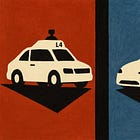The Autonomous Divide: Comparing China's L4 Robotaxi and the Tesla Doctrine | Part 2
world model #11
Following up on Part 1,
the previous article of The Autonomous Divide, Part 2 will dive into the user experience (UX) design, pricing models, and privacy considerations shaping the future of autonomous mobility.
The Passenger Perspective - User Experience (UX)
Beyond the technology and regulations, the success of robotaxis will ultimately depend on the quality of the passenger journey. An analysis of the user experience (UX), from hailing the ride to arriving at the destination, reveals a contrast between a highly curated pilot program and the unvarnished reality of large-scale public deployment.
The Tesla Experience: Curated, Simple, and Hyped
Tesla has designed its robotaxi UX to be as seamless and familiar as possible. The service is not a standalone application but is integrated directly into the main Tesla app, a platform already familiar to its target audience of Tesla owners and enthusiasts. The user interface is clean and intuitive, mirroring the design of popular ride-hailing services like Uber and Lyft. Users can select pickup and drop-off points, receive real-time updates on their vehicle's arrival, and even pre-set their preferred cabin temperature. The app also includes "smart suggestions" for local destinations and helpful tips for first-time riders, such as how to operate the Model Y's flush door handles.
Tesla APP UI
Keep reading with a 7-day free trial
Subscribe to World Model to keep reading this post and get 7 days of free access to the full post archives.



